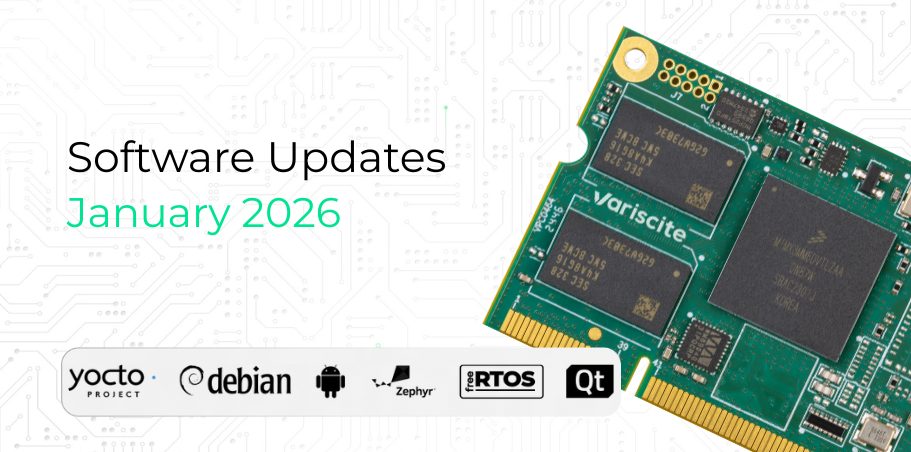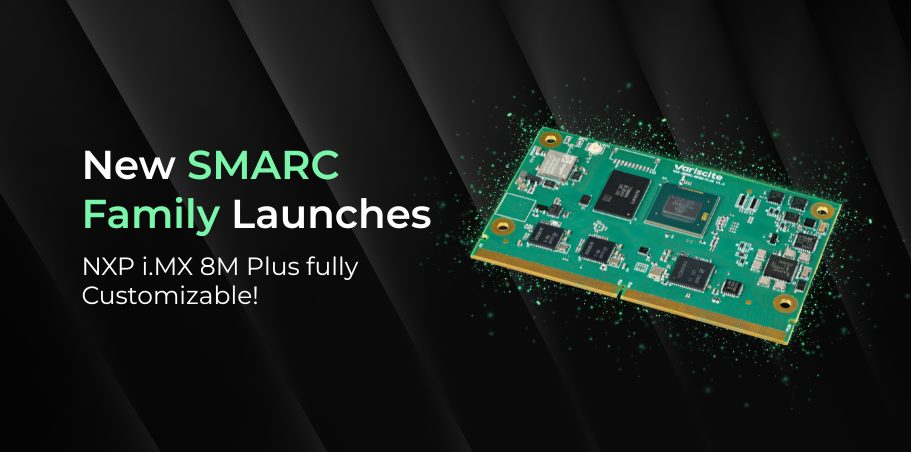Highlights
CPU
Up to 1.8GHz Quad Cortex™-A53 NXP i.MX 8M Mini
Dimensions
67.8 x 33mm
Certified WiFi/BT
802.11 ac/a/b/g/n + BT 5.2/BLE
Temperature range
-40 to 85°C
Multimedia
1080p60 encode, decode and display, HQ audio, HD GPU
Product Longevity
2034

Support
Wir unterstützen Sie bei jedem Schritt – vom Konzept bis zur Markteinführung und darüber hinaus.
Kostenloser und schneller Support von den Variscite-F&E-Experten.
Schnelle Links







Spezifikationen
CPU Name
NXP i.MX8M Mini
CPU Type
Cortex™-A53
CPU Cores
4 Cores
CPU Clock (Max)
Up to 1.8GHz
Real-time co-processor
400MHz Cortex™-M4
Integer performance (DMIPS)
Up to 16,560
RAM
1 – 4 GB DDR4
eMMC
8 – 128 GB
Multimedia
2D/3D Graphics Acceleration
Vivante GC320/GC NanoUltra
Video Encode / Decode
1080p60 H.265/H.264/VP9 Decode, 1080p60 H.264/VP8 Encode
Camera Interfaces
MIPI-CSI2
Display
DSI
MIPI-DSI 1920×1080 24-bit
LVDS
Dual 1920x1080 24-bit
Touch controller
Resistive, Capacitive
Audio
Headphone driver
Yes
Microphone
Digital, Analog (stereo)
Digital audio serial interface
5 x I2S(SAI), S/PDIF, PDM 4CH
Line In/Out
Yes
Connectivity
SD / MMC
x1
USB Host / Device
USB2.0: 2x OTG
UART
x4, up to 4 Mbps
I2C
x3
SPI
x3
CAN Bus
CAN/CAN-FD (Flexible Data-Rate)
RTC
On carrier
JTAG
x1 (via optional header)
PCI-Express
Gen 2.0
Networking
Ethernet
10/100/1000 Mbps
Wi-Fi
V1: Certified Wi-Fi 5 dual-band 802.11 ac/a/b/g/n
V2: Certified Wi-Fi 6 dual-band 802.11ax/ac/a/b/g/n with optional 802.15.4, matter
V2: Certified Wi-Fi 6 dual-band 802.11ax/ac/a/b/g/n with optional 802.15.4, matter
Bluetooth
V1: BT/BLE 5.2
V2: BT/BLE 5.4
V2: BT/BLE 5.4
Linux
Yocto, Debian, Boot2Qt
Android
Yes
FreeRTOS
Yes
Mechanical Specifications
Dimensions (W x L)
67.8 x 33.0 mm
Electronic Specifications
Supply voltage
3.3 V
Digital I/O voltage
3.3 V
Environmental Specifications
Commercial operating temperature
0 to 70°C
Extended operating temperature
0 to 85°C
Industrial operating temperature
-40 to 85°C
Storage temperature
-40 to 85°C
Storage humidity
5% to 95%
VAR-SOM-MX8MM[x]_V2_[xxxx]C_[xxxx]R_[xx]G_[AC]_[EC]_[LD]_[TP]_[CN]_[WBD/ WBE]_[X]T
MX8MM[x]:
CPU type: Quad : [Q]
[xxxx]C:
CPU clock speed: 1800MHz: 1800C (CT/ET grade), 1600MHz: 1600C (IT grade)
[xxxx]R:
DDR4: 1024 MB: 1024R, 2048 MB: 2048R, 4096 MB: 4096R
[xx]G:
eMMC: 8 GB : 8G, 16 GB : 16G, 32 GB : 32G, 64 GB : 64G, 128 GB : 128G
[AC]:
Audio Codec
[EC]:
GbE PHY
[LD]:
LVDS interface
[TP]:
Resistive touch panel controller
[CN]:
CAN bus bridge
[WBD/WBE]
V2 WiFi/BT:
WBD: Built-in certified Wi-Fi 6 dual band 802.11ax/ac/a/b/g/n + BT/BLE 5.4
WBE: Built-in certified Wi-Fi 6 dual band 802.11ax/ac/a/b/g/n + BT/BLE 5.4 + 802.15.4
WBD: Built-in certified Wi-Fi 6 dual band 802.11ax/ac/a/b/g/n + BT/BLE 5.4
WBE: Built-in certified Wi-Fi 6 dual band 802.11ax/ac/a/b/g/n + BT/BLE 5.4 + 802.15.4
[x]T:
C : 0 to 70°C, E: 0 to 85°C, I : -40 to 85°C
VAR-SOM-MX8MM[x]_[xxxx]C_[xxxx]R_[xx]G_[AC]_[EC]_[LD]_[TP]_[CN]_[WB[D]]_[X]T
MX8MM[x]:
CPU type: Quad : [Q]
[xxxx]C:
CPU clock speed: 1800MHz: 1800C (CT/ET grade), 1600MHz: 1600C (IT grade)
[xxxx]R:
DDR4: 1024 MB: 1024R, 2048 MB: 2048R, 4096 MB: 4096R
[xx]G:
eMMC: 8 GB : 8G, 16 GB : 16G, 32 GB : 32G, 64 GB : 64G, 128 GB : 128G
[AC]:
Audio Codec
[EC]:
GbE PHY
[LD]:
LVDS interface
[TP]:
Resistive touch panel controller
[CN]:
CAN bus bridge
[WB[D]]
WB: Built-in certified single band Wi-Fi 802.11 b/g/n + Bluetooth 5.1/BLE
WBD: Built-in certified dual band Wi-Fi 802.11 ac/a/b/g/n + Bluetooth 5.2/BLE
WBD: Built-in certified dual band Wi-Fi 802.11 ac/a/b/g/n + Bluetooth 5.2/BLE
[x]T:
C : 0 to 70°C, E: 0 to 85°C, I : -40 to 85°C
Note: All options in [brackets] are optional add-ons that can be either removed or selected from a list of options
Dokumentation
Unsere langjährigen Partnerschaften
Unsere engen Partnerschaften mit führenden Technologieanbietern bieten unseren Kunden frühzeitigen Zugriff auf die neuesten fortschrittlichen Lösungen und stellen sicher, dass Ihre Projekte auf einer soliden und zukunftssicheren Grundlage beginnen.


Evaluation Kit
VAR-SOM-MX8M-MINI Evaluation Kits

Fordern Sie Ihr individuelles Angebot an
Füllen Sie die folgenden Angaben aus und einer unserer Vertreter wird sich in Kürze mit Ihnen in Verbindung setzen.
Why Variscite?

Qualität
Eigene Herstellung mit umfassender Qualitätskontrolle – zertifiziert nach den medizinischen Standards ISO 9001 und ISO 13485.

Pin2Pin
Unsere Pin2Pin-Produktfamilien maximieren die Skalierbarkeit und ermöglichen eine nahtlose Migration auf zukünftige Technologien ohne Neugestaltung der Trägerplatine.

Langlebigkeit
15 Jahre garantierte Hardware-Verfügbarkeit, unterstützt durch kontinuierliche Software-Updates und Support.

Anpassbarkeit
Konfigurieren Sie Ihr System mit Präzision und Flexibilität – wählen Sie nur die Funktionen, die Sie benötigen, und senken Sie die Kosten.
Updates

Bleiben Sie mit Software-Updates auf dem Laufenden – Sorgen Sie mit unseren neuesten Software-Versionen dafür, dass Ihre Variscite-SoMs immer die optimale Leistung erbringen.
07.01.2026
Variscite, ein weltweit führendes Unternehmen im Bereich Design und Fertigung von System-on-Modules, stellt eine neue Serie von Modulen gemäß dem Standard „Smart Mobility Architecture“ (SMARC) vor. Der VAR-SMARC-MX8M-PLUS markiert den Einstieg in dieses Portfolio, das vom NXP i.MX 8M Plus-Prozessor angetrieben wird.
29.01.2026
Die Wahl Ihres SoM-Partners beginnt mit dem Verständnis der Fertigungsmodelle
27.11.2025



























